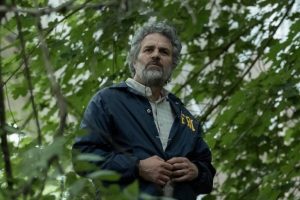Author Wendell Berry famously lives in Henry County, Kentucky, which went for presidential nominee Donald Trump by a 46 percent margin in 2020. Still, Berry says, he maintains friendly relations with his Trumpist neighbors when they meet at the farm supply store. In his most recent book, The Need to Be Whole (Shoemaker), he writes that this is a necessity of rural life: “If two neighbors know that they may seriously disagree, but that either of them, given even a small change of circumstances, may desperately need the other, should they not keep between them a sort of pre-paid forgiveness? They ought to keep it ready to hand, like a fire extinguisher.”
Berry’s fellow Kentuckian, the country singer-songwriter Tyler Childers, is also very much a product of his place. Childers writes songs about contemporary rural life with melodies that sound 300 years old. He regularly sells out arenas. His most popular songs get Spotify streams in the hundreds of millions. He’s rich. He could live anywhere, but he’s stayed on his native soil in Appalachian Lawrence County (which Trump carried by 63 points in 2020).
In fact, as Childers’ fame and fortune have grown, he has actually become more locally rooted. His first two studio albums, Country Squire and Purgatory, were recorded in Nashville with session players. But the next one, his pandemic album Long Violent History, was a lo-fi collection mostly of traditional fiddle tunes recorded at his homeplace with local musicians.
But, as Berry often does in his writing, Childers used this deep dive into his roots to set the context for a message he knew some of his audience wouldn’t like. The album came out in September 2020, in the wake of the George Floyd summer, and in the title track Childers asks his white, rural listeners to consider how they would react if their relatives and friends were regularly shot “full of holes, cuffed and [laid] in the street.”
The message to his people was even more pointed in a six-minute video released with the album. There he spun out analogies rich in regional detail to show his audience that, rather than “being taken aback” at Black Lives Matter protests, they should empathize with them and even support them. What, he asked, would his audience think if they were confronted with a headline stating: “Ashland Community and Technical College Nursing Student Shot in Her Sleep”? Well, Childers said, that’s what happened in Louisville to “Breonna Taylor, a Kentuckian like me.”
He also addressed the “heritage, not hate” defense of the Confederate flag commonly heard in the white South. That flag, he said, has a “history steeped in racism and treason.” He recommended that his people instead affirm their heritage by doing “things like hewing a log . . . learning a fiddle tune, growing a garden, raising some animals . . . sewing a quilt.”
Childers’ current release, Can I Take My Hounds to Heaven? extends this “yes, but” relationship with his place and people. Recorded with his band, The Food Stamps, in Huntington, West Virginia, it’s a gospel album, that oldest of country music traditions. Every country star makes one eventually, and Childers’ cover of “Old Country Church” and originals such as the title track and “Way of the Triune God” fit the traditional mold. However, this is a country music star’s gospel album that comes with a quote from the Hindu scriptures on the cover and features a third disc that is a remix of songs from the first two. There’s also an original song called “Angel Band” (title cribbed from a gospel standard) that envisions a heaven with “Hindus, Jews, and Muslims / and Baptists of all kinds.”
Once again Childers affirms the culture and traditions of his people and audience, but he nudges them toward a more inclusive version of the tradition. He’s also been doing something like that with his live shows lately. At a Lexington benefit concert for victims of the Eastern Kentucky floods, Childers stepped aside in the middle of his set and gave the microphone to S. G. Goodman. A self-described queer singer-songwriter, Goodman grew up as a Western Kentucky farm girl and has made her home in the nearby town of Murray, deliberately choosing to maintain bonds even with family and neighbors who might dislike aspects of who she is. Goodman is also opening several of the shows on Childers’ current tour.
Floating in and out of the music on the Can I Take My Hounds to Heaven? remix disc is archival audio from, among other things, Holiness church services and the Andy Griffith Show. On the last track, as the music fades, the disc closes with a clip of adopted Kentuckian Thomas Merton, saying, “So I will disappear from view, and we can all have a Coke or something.” That was Merton’s last public utterance, at the end of a talk on monasticism in Thailand.
The Merton clip didn’t really surprise me. Ever since I heard “Universal Sound” on Childers’ Purgatory album, I’ve thought of him as a natural mystic. There he sings, “I focus on my breathing and the universal sound / I let it take me over from the toenails to the crown.” And in the last verse, “I’ve been up on the mountain, and I’ve seen His wondrous grace / I’ve sat there on a bar stool, and I’ve looked Him in the face.”
That down-to-earth take on the beatific vision may be what we need to imagine an earthly community that can encompass the family of Breonna Taylor and that guy in a truck with the Trump banner. But just like the residents of Berry’s rural hometown, we really don’t have a choice. If we’re going to have healthy communities and a livable environment, we’ve got to all pull together against the forces that profit from our divisions. We do, as Berry puts it, “desperately need each other.”
This article also appears in the February 2023 issue of U.S. Catholic (Vol. 88, No. 2, pages 36-37). Click here to subscribe to the magazine.
Image: Paul R. Giunta/Invision/AP














Add comment